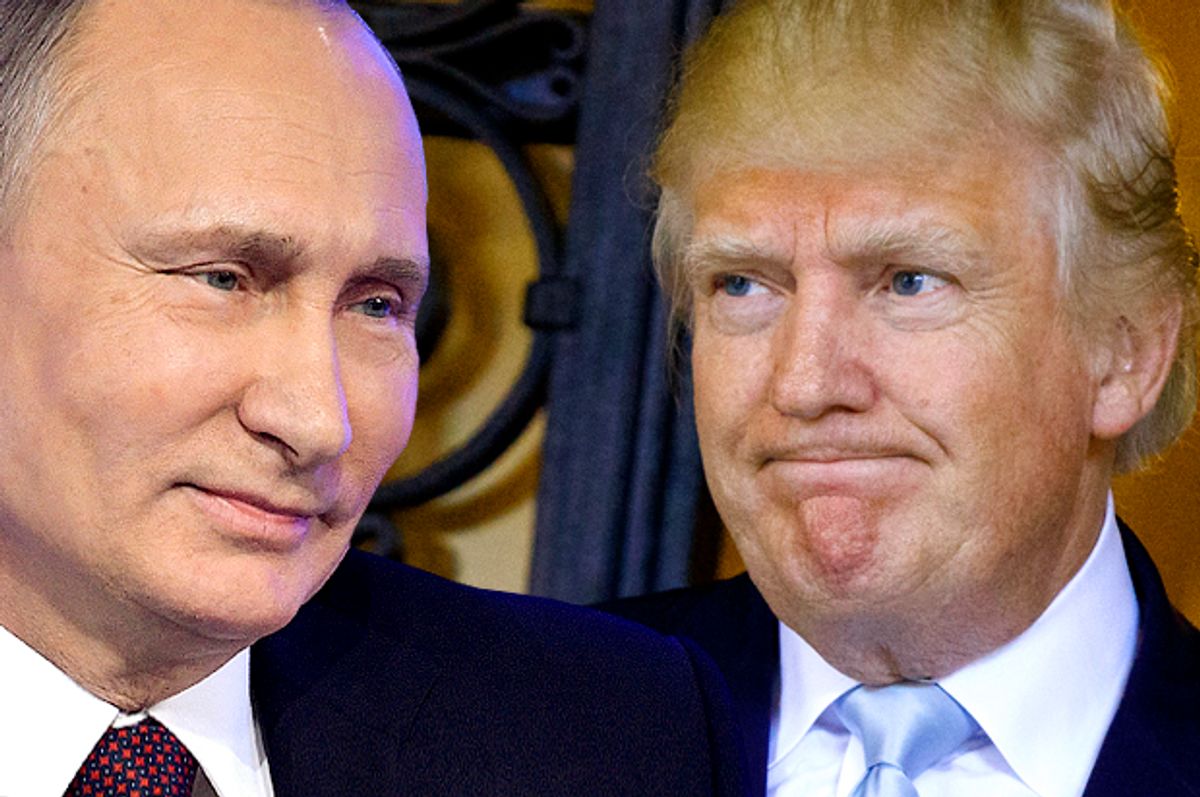UPDATED 1:50 p.m.: It appears that President Trump has signed the sanctions bill, further prompting the question: If the Russia attack was fake, why retaliate? Naturally, the rest of us know what happened, and now Trump seems to have acknowledged the existence of the Russian attack with his signature. In a particularly whiny statement, Trump said, “I also support making clear that America will not tolerate interference in our democratic process, and that we will side with our allies and friends against Russian subversion and destabilization.” That’s a far cry from calling it a “hoax.” Ultimately, chalk up another win for Congress – Trump’s admission alone was worth the effort of passing the bill.
* * *
For the last several weeks, there has been considerable speculation over whether President Donald Trump would sign the latest round of congressional sanctions imposed against Russia. The bill breezed through Congress with overwhelmingly bipartisan support, but naturally no one knew how Trump would react. After all, the bill punishes Russia for interfering in the 2016 election, an attack which Trump believes never occurred: It's all a hoax concocted by sour-grapes Democrats!
Furthermore, it’s clear that Trump has been compromised by the Kremlin, and if he were to authorize new sanctions while still not lifting others -- including those outlined in the recently discussed Magnitsky Act -- he might be subject to personal retaliation by Vladimir Putin.
In other words, if Trump signs the bill, he’s tacitly admitting that the attack is real, despite his previous claims, while simultaneously opening himself up to a response by Russian intelligence -- perhaps in the form of leaked “Kompromat” on himself, his kids or Jared Kushner, his son-in-law. If he doesn’t sign the bill, Trump will further reveal himself as a likely tool of Moscow whose complicity and cooperation is being extorted by a hostile overseas regime.
You’re Trump. What do you do?
Before I continue, I hasten to note that he could actually sign the bill at any moment. As of this writing, however, it’s been six days since the bill was passed by the U.S. Senate then delivered to the White House. According to Congress.gov, the bill landed on the president’s desk for signing or veto on Friday, July 28. It’s now August 2, and neither of those things has happened. Why not?
First, Trump might be deliberately dragging his feet. He wouldn’t want Putin to get the impression that he’s being overzealous in signing the sanctions. It’s also possible that the White House counsel’s office is working with the president to craft a signing statement that might ease the impact of the Russian portion of the bill (Iran and North Korea are also sanctioned in the bill). I’d wager that if he signs, there will absolutely be a signing statement -- a statement, by the way, that might as well start with the words, “Dear Vladimir: I’m soooo sorry!![Grimacing emoji.] Believe me.”
There’s also, of course, the veto. While we know that Congress easily has the votes to override, and even though the White House signaled throughout the past week that Trump would sign the bill, the president has often contradicted the messages of his staff. See also the various excuses for firing James Comey. (If you recall, the White House first claimed Comey was fired because of the Hillary Clinton email investigation, only for Trump to tell Lester Holt that it was all about the Russia probe.) We’re also hearing that Trump and Secretary of State Rex Tillerson aren’t happy with the bill.
So it’s perfectly within the president’s style to zig when his staff said he’d zag. They said he’d sign the bill, but it’s ultimately up to Trump’s whimsy. And don’t forget: He’s almost exclusively playing to his 38 percent base. All he’d need to do is to tweet this: After reviewing the sanctions, I determined it was a “bad deal” for the American people. Start over! That’s it. His base would be satisfied, and by lunchtime of the same day, it’s likely everyone else would have moved on to the next big scandal, forgetting that he vetoed the sanctions even after his own vice president said Trump would sign the bill “very soon.”
There's also a more unconventional route by which Trump can allow the bill to pass without his signature. Trump could simply plunk the bill in a desk drawer for the next five days until it automatically becomes law. The Constitution allows the president 10 days to sign. If he hasn't done so, and Congress hasn’t adjourned, the bill becomes law without his signature. We also know that the Democrats are working to keep Congress in session, partly in order to prevent Trump from firing Attorney General Jeff Sessions and then recess-appointing his successor. If for some reason Congress officially goes into recess and Trump hasn’t signed the bill, that’s a "pocket veto." The legislation will need to be reintroduced and passed again.
By allowing the bill to slip into law after 10 days, Trump perhaps avoids being blamed by Russia for the sanctions and thus avoids any repercussions from his controllers in Moscow. Meanwhile, the White House political team might try to avoid domestic repercussions by pulling another semantics stunt: Instead of “alternative facts,” perhaps they’d frame his non-signature as an “alternative signing.” Trump simply allowed the bill to become law without bothering to sign it. Or perhaps even notice it.
Nevertheless, the clock is ticking, and it should be abundantly obvious by now that whichever solution Trump devises for himself will have the interests of Putin and Kompromat in mind, not to mention the severe legal jeopardy to which he has already subjected himself, his family and his staff.



Shares